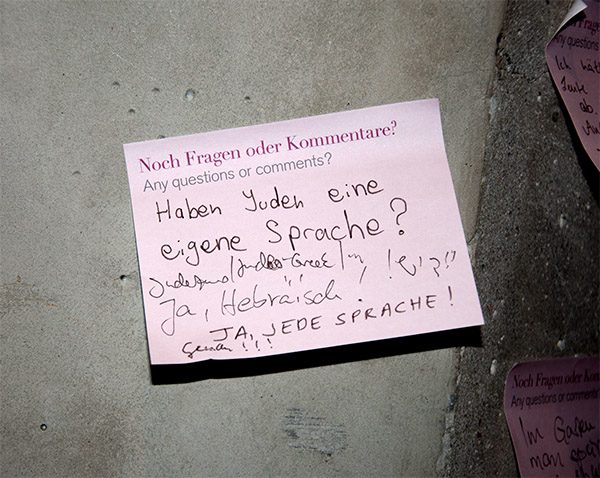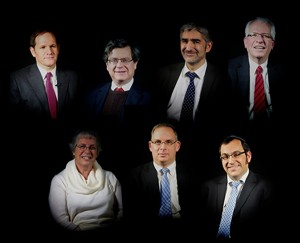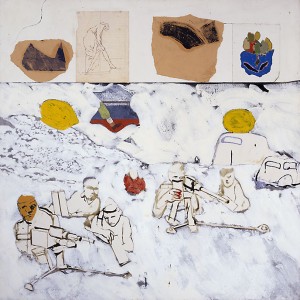“Do Jews have their own language?”
Our special exhibition “The Whole Truth… everything you always wanted to know about Jews” is based on 30 questions posed to the Jewish Museum Berlin or its staff over the past few years. In the exhibition, visitors have their own opportunity to ask questions or to leave comments on post-it notes. We answer some of these questions here in our blog.

“Do Jews have their own language? / Judezmo / Judeo-Greek / Yiddish! / Yes, Hebrew! / Yes, every language! Exactly!!!”
© Jewish Museum Berlin, photo: Jonathan Traenckner
This query is in fact part of any FAQ list about Judaism: it came within a hair’s breadth of being included in the exhibition. → continue reading
Are we allowed to drive a car to synagogue services on Shabbat? If my father is Jewish and my mother is Christian, what am I? Can an uncircumcised man be Jewish?

Seven rabbis (left to right): Joshua Spinner, Irith Shillor, Daniel Katz, Julien-Chaim Soussan, Jonah Sievers, Avichai Apel, Gábor Lengyl
© Jewish Museum Berlin, photos: Thomas Valentin Harb
The new special exhibition, “The Whole Truth… everything you always wanted to know about Jews,” deals with common as well as uncommon questions about Judaism. We put some of these questions to seven rabbis and filmed their responses. All of them serve in Germany and represent a wide spectrum of religious belief: orthodox, liberal, conservative, progressive.
Inspired by research done on a number of Internet forums with names like “Ask the Rabbi,” “Askmoses,” and “Dear Rabbi,” in which rabbis from all over the world answer questions on how to handle religious law in everyday life, we organized the shooting of this film → continue reading

R.B. Kitaj, Kennst Du das Land?, 1962 © R.B. Kitaj Estate
A few years ago during a summer spent in Catalonia, I strolled through the port city of Sant Feliu de Guíxols. It is a special place: it was spared the transgressions of the Spanish coast’s building mania due to its fishing industry. It is not merely decorative but in fact successful in a particular industrial branch: producing cork. And here – nominally part of Spain but somehow a place all of its own – R.B. Kitaj and his wife spent the winter of 1953/54. Twenty years later, he bought a house in this town. What did it mean to him, this stubborn region that again and again rebelled against Spanish supremacy? → continue reading


